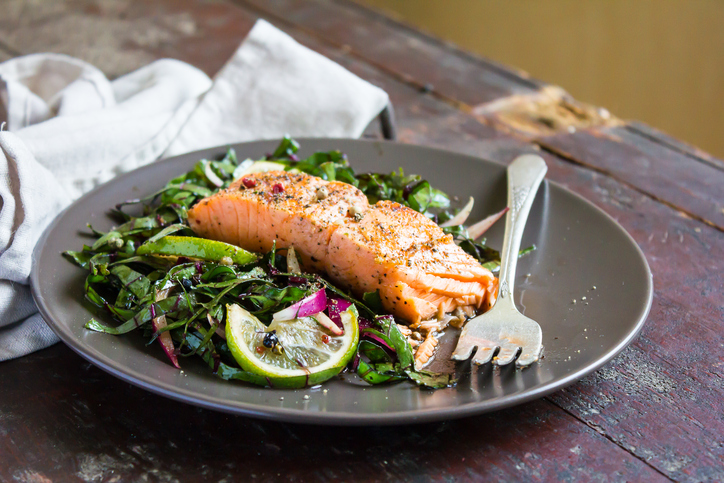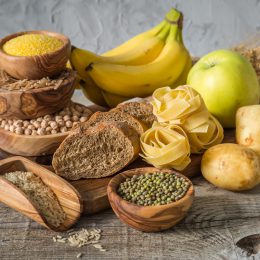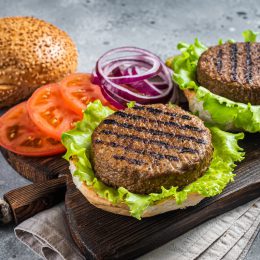5 Nutrients You’re Not Getting Enough Of
Your nutrition needs change as you get older. Here’s what your body is craving.

Think you’ve got this whole nutrition thing down by now? Think again.
Sure, you have an impressive résumé. Decades of experience with meal planning and eating. Oversaw the nutritional needs of children. Key adviser in limiting grandchildren’s exposure to Dr. Pepper.
Problem is, the job is changing every year. The older you get, the less efficient your body is at absorbing and using the nutrients you eat, explains California-based dietitian Lori Zanini, R.D., C.D.E. So unless you’re making a concerted effort to increase your intake of key nutrients, you’re likely falling short.
In fact, a recent study from the University of North Carolina found that 60 percent of older adults (without cognitive impairment) who are admitted to emergency rooms are either malnourished or at risk of malnutrition.
“Getting adequate nutrition is vital to overall health, function, quality of life and, ultimately, longevity,” explains Abby Sauer, M.P.H., R.D., a dietitian specializing in adult and geriatric nutrition.
Here are five nutrients that every older adult needs for better health — and how to make sure you’re getting enough of each.
1. Protein
“To maintain muscle mass and proper functioning, older adults need to eat double the amount of protein that they needed in their younger years,” Sauer says. That’s right, double.
In one American Journal of Physiology—Endocrinology and Metabolism study, adults ages 52 to 75 improved their muscle health by following a diet containing 1.5 grams of protein per kilogram of bodyweight per day. That’s roughly twice the current recommended daily allowance.
Since eating meals with a calculator in hand isn’t much fun, Sauer recommends building each of your meals and snacks around a protein-rich food. Legumes (beans, lentils, and chickpeas) as well as dairy, eggs, fish, and lean meats are all great sources. If you have a hard time meeting your daily requirement, your doctor or dietitian may recommend complete nutrition supplements or protein shakes. Meal plans like Nutrisystem are a convenient way to cover your nutritional needs without doing the math.
2. Calcium
Long known as a bone-building all-star, calcium is key during childhood (when your bones are growing) and older age (when bone mineral density and strength generally declines). The National Institutes of Health recommends gradually increasing intake from 1,000 mg to 1,200 mg per day as you pass age 50. Not because your body needs more, but because its ability to absorb and use calcium declines with age, Zanini says.
Unfortunately, many older adults experience stomach discomfort if they consume too much dairy, according to Sauer. If that applies to you, opt for lactose-free milks such as Lactaid or Fairlife ultra-filtered milk. The latter contains 30 percent more calcium (and 60 percent more protein) than traditional milk.
3. Vitamin D
People of all ages can have a vitamin D deficiency, but it tends to become even more severe at 65+ and is associated with a significantly greater risk of falling and suffering injuries from falls, according to one review published in The American Journal of Clinical Nutrition.
Subscribe to our newsletter
It's quick and easy. You could be one of the 13 million people who are eligible.
Already a member? Click to discover our 15,000+ participating locations.
Follow Us
“Vitamin D is essential to both bone and muscle health,” says Sauer. Talk to your doctor about your diet and lifestyle, and ask if you’re getting enough vitamin D. He or she may recommend dietary changes—eating more fatty fish, dairy, and eggs—or taking a supplement.
4. Fiber
“Everyone has trouble getting enough fiber into their diets, but fiber needs actually increase as you get older,” Sauer says. Make this a priority: Higher fiber intake is related to lower risk of heart disease.
Swap white bread and pasta for whole grain varieties, and make sure your diet is rich in legumes, fruits, and vegetables. Your doctor may also recommend a supplement like Metamucil or Citrucel to meet your daily requirements.
5. Water
“This one gets ignored a lot when we talk about nutrients, but it’s one of the most important to human life and health,” Sauer says. While the amount of water you need doesn’t increase as you age, your body’s thirst mechanism can get lazy. So it’s important to drink even if you aren’t thirsty.
Keep a refillable water bottle with you whenever possible. Remember that fluid-filled foods (such as fruit and soup) as well as beverages (including tea and even coffee) hydrate you, too.
The eight-glass-a-day rule is more of a suggestion these days. Fact is, your hydration needs vary depending on the foods you’re eating, how much you’re exercising, and any health conditions you may have. The one gauge that’s pretty reliable: If your urine isn’t clear, your body needs more water.





